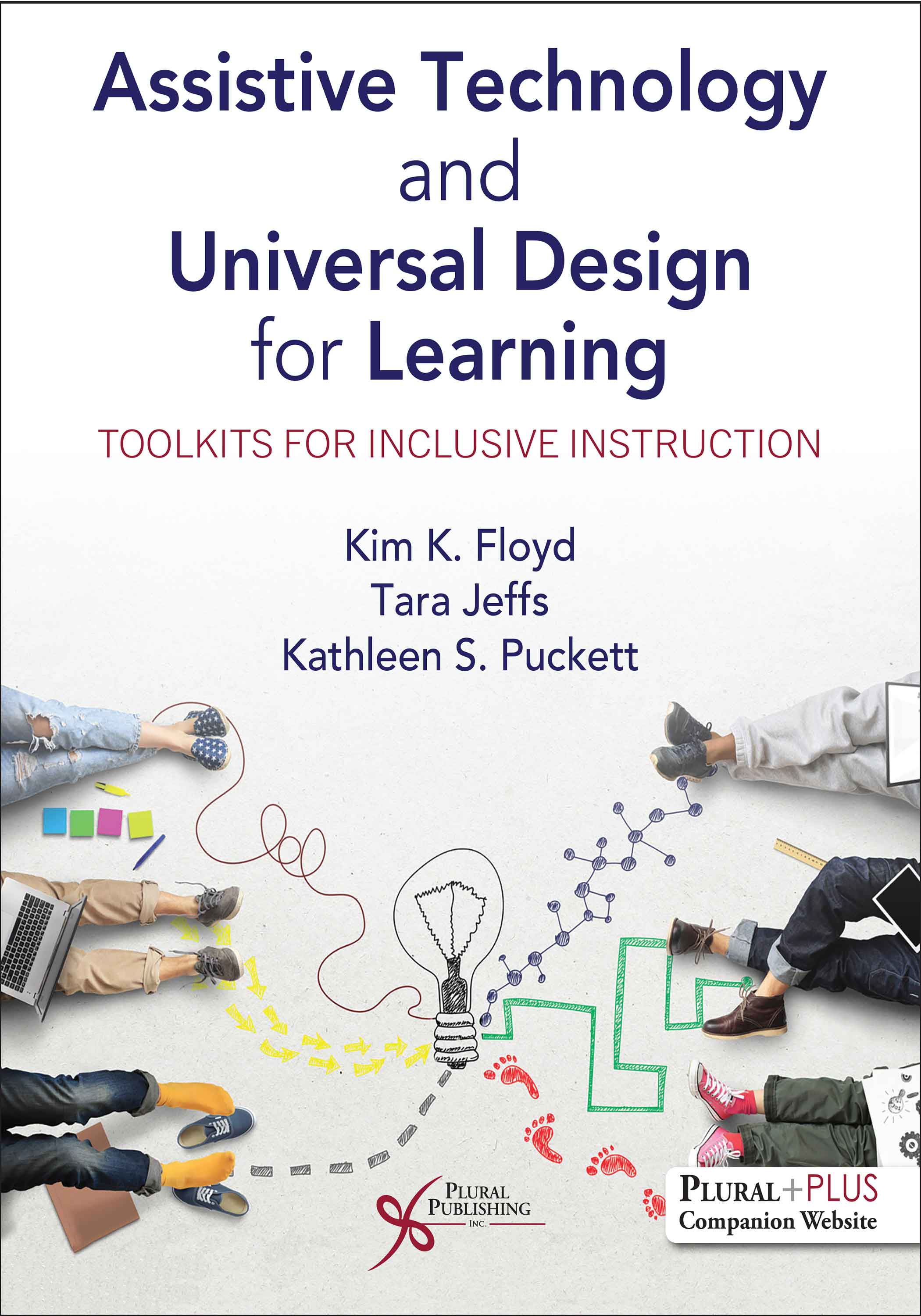
Assistive Technology and Universal Design for Learning: Toolkits for Inclusive Instruction
First Edition
Kim K. Floyd, Tara Jeffs, Kathleen S. Puckett
Details: 318 pages, B&W, Softcover, 8.5" x 11"
ISBN13: 978-1-63550-752-2
© 2026 | Available
For Instructors
Purchase
Assistive Technology and Universal Design for Learning: Toolkits for Inclusive Instruction is an innovative textbook on instructional and assistive technology. Designed for both undergraduate and graduate teaching programs, student readers can expect to gain a thorough understanding of how assistive technology and UDL can be integrated into educational settings.
This text delves into data analytics platforms for analyzing student behavior, learning management systems for facilitating communication, and software emphasizing UDL. Students will learn how to create accessible environments and systems while also focusing on multiple means of representation, engagement, and expression to accommodate all learners. With a developmental focus that supports learners across intellectual, sensory, and motor challenges, this text will serve as a valuable guide on how these technologies can be utilized to effectively transform the classroom and revolutionize education.
Key Features
- Infuses assistive technology and UDL
- Includes a unique chapter on distance education, behavior, and emerging technologies
- Has a developmental focus that supports learners across intellectual, sensory, and motor challenges
- Toolkits that include resources, strategies, and instructional methods to equip readers to foster an inclusive classroom environment across content areas
- Learning Outcomes at the beginning of each chapter to provide clear direction for navigating the content
- Chapter summaries that support understanding of key concepts
- Chapter activities that support integrating technology within the curriculum
- Glossary with definitions of key terminology used throughout text
- Chapters that are authored by respected experts within the special education field
From the Foreword
"I am honored to have been asked to write this foreword for a book that combines two of my passions: assistive technology and inclusive instructional design. As you explore the use of technology guided by the authors of each chapter, I hope you keep a quote I first heard from CAST founder David Rose in the back of your mind – "we do not want to provide access to boredom." We want to use technology to ensure all learners, including those who have disabilities, multi-lingual learners, and others who have been marginalized in education, have access to educational opportunities that reflect their identities, interests, passions, creativity, and joy for living."
—Luis Perez, PhD, Disability and Digital Inclusion Lead, CAST
PluralPlus Online Ancillaries
For instructors: PowerPoint Slides, Test Bank
For students: Quizzes
Reviews
“The book is well organized and covers all key aspects of assistive technology and UDL. The text provides foundational information that pre-service teachers need to build a solid understanding of AT and UDL. Additionally, the topics covered in each chapter would allow pre-service teachers to identify challenges students with disability face in content/functional areas and the supports that are available for them.”— Iffat Jabeen, PhD, University of Texas at San Antonio
Foreword
Preface
About the Authors
Contributors
Chapter 1. Introduction
Kim K. Floyd and Tara Jeffs
Rationale for Assistive Technology
Definition and History of Assistive Technology
Early Innovations (1950s–1960s)
The Emergence of Computer-Based Solutions (1970s–1980s)
Legislation and Formal Recognition (1990s)
Technological Advancements (2000s–Present)
Integration Into Inclusive Education (Present)
Why Assistive Technology Toolkits?
Multitiered Support System
Tier 1
Tier 2
Tier 3
How This Book Is Organized
Chapter 2
Chapter 3
Chapter 4
Chapter 5
Chapters 6 Through 9
Chapter 10
Chapter 11
Chapter 12
References
Chapter 2. Principles of Assistive Technology
Marci Kinas Jerome and Tara Jeffs
Vision of Technology Use
AT Consideration
A Note on Funding
Putting it All Together
AT Implementation
Up-Front Planning for AT Implementation
Creating an AT Implementation Plan
Data and Outcomes
Continuous Monitoring
AT Implementation: Meet Sophia
AT Services
Training
Backups, Maintenance, and Repair
Getting Started and Tips for Success
Remember the Goal
Start Small
Be Observant
References
Chapter 3. Principles of Universal Design for Learning
Laura King, Debbie Metcalf, and Lora Lee Smith Canter
Overview of Universal Design for Learning
Meeting the Needs of Diverse Learners
Defining Universal Design for Learning
Legal Provisions
Theoretical Foundations
Neuroscience and the Universal Design for Learning Framework
Three Essential Principles of UDL: A Closer Look
Multiple Means of Engagement
Multiple Means of Representation
Multiple Means of Action and Expression
Evaluation and Assessment
Assistive Technology and Universal Design for Learning
Use of Assistive Technology
Instructional Technology and Universal Design for Learning
Accessibility Features
Access to Learning Environment
Access to Curricula
Access to Media
Putting Universal Design Into Practice
Incorporation Into Lesson Planning
Goals
Assessment
Materials and Resources
Methods
The UDL Lesson Plan
Evaluation of Learner Outcomes
Summary
Chapter Activities
References
Chapter 4. Assistive Technology Assessment Approaches
Anya S. Evmenova and Roba Hrisseh
Introduction
Best Practices in Assistive Technology Assessment
Quality Indicators of Assistive Technology
Use of Team Approach in Assistive Technology Assessment
Assistive Technology Assessment Approaches
Matching Person and Technology Model
MPT Implementation Example
Assessing Students’ Need for Assistive Technology
WATI Implementation Example
Student, Environment, Tasks, and Tools Model
SETT Implementation Example
Functional Evaluation for Early Technology Model
Skill-Specific Assessments
AAC Assessments
AAC Assessment Implementation Example
Additional Considerations
Switch Access Measure
uPar Assessment
Data-Driven Decision Making After AT Assessments
Data-Driven Decision Making and AT Implementation
Data-Driven Decision Making and Instructional Decisions
Assistive Technology and Universal Design for Learning
UDL Assessment
Important Considerations for AT and UDL Assessments
Privacy and User Autonomy
Global Perspectives
Cultural Responsiveness
Artificial Intelligence
Remote AT Assessment
Summary
References
Chapter 5. Toolkits to Support Early Childhood
Colleen W. Wood-Fields
Introduction
Learning Expectations and Challenges in Early Childhood Settings
Universal Design for Learning and Assistive Technology
UDL and Assistive Technology
AT Selection
Barriers Affecting the use of AT
AT Toolkit
Play and Socialization
Accessible Play Materials
Accessible Physical Activities
Accessible Play Areas
Strategies to Foster Play Interactions
Mobility
Physical Environment
Communication
Dual-Language Learners
Mealtime Communication
Visual Aids
Cue Cards
Visual Schedules
Contingency Map
Learning
Tablets and Tablet Apps
Science, Technology, Engineering, and Math Instruction
Self-Care
Chaining
Modeling
Assistive Technology and Self-Care
Early Literacy
Early Literacy and AT
Adapted Books
Digital E-Books
Squishy Books
Summary
References
Chapter 6: Toolkits to Support Literacy
Deborah L. Rooks-Ellis and Sara M. Flanagan
Language and Literacy Theories
Pause Point
Chall’s Stages of Reading Development
Ehri’s Phases of Reading Development
Pause Point
Stages of Literacy Development
Early Emergent Literacy
Play-Based Learning and Literacy Development
Pause Point
Emergent Literacy
Print Awareness
Alphabetic Knowledge
Phonemic Awareness
Vocabulary Development
Developing Literacy
Independent Reading
Fluency
Vocabulary
Comprehension
Literacy Challenges for Students With Disabilities
Decoding
Fluency
Vocabulary
Comprehension
Assistive Technology
Improving Preliteracy Skills With Technology
Technology Supports for Fluency, Vocabulary, and Comprehension
Pause Point
Universal Design for Learning and Literacy
Pause PointSummary
References
Chapter 7: Toolkits to Support Writing
Kathleen S. Puckett
Problems That Students With Disabilities Have With Writing
Evidence-Based Writing Practices
Technology Tools That Support Planning, Drafting, Reviewing, Editing, and Sharing
Operating System Features and Supports
Tools That Support Planning
Tools That Support Drafting
Templates
Writing From an Outline
Autocorrect
Word Prediction
Voice Recognition
Specialized Word Processors
Tools That Support Revising and Editing
Adding Content
Reading the Text Aloud
Spelling and Grammar
Word Choice Tools
Formatting
Tools That Support Sharing and Publishing
Sharing
Publishing
Tools That Support Keyboarding
Online Keyboarding Programs
Tools That Support Note Taking
Tools That Support Strategy Instruction
Summary
References
Chapter 8: Toolkits to Support Communication
Melinda Jones Ault, Judith L. Page, Margaret E. Bausch, Jaqueline F. Kearns, Kai O’Neill, and Enrika Wright
Introduction to Communication
What Is Communication?
Augmentative and Alternative Communication
What Is AAC?
Who Uses AAC?
Who Is Eligible for AAC?
What Are Benefits of AAC Use?
Levels of AAC
Basic AAC Components
Access
Language Options
Symbol Type
Vocabulary
Display
Message Storage
Output
How Is a Device Selected?
Self-Determination in AAC Use
Incorporation of AAC in Inclusive Classroom Instruction
Involvement of Team in Program Planning
Ensuring Continuous Access and Communicative Opportunities
Selecting Vocabulary for Active Participation
Providing Ongoing Language Modeling
Providing Staff Training
Incorporating Peer-Mediated Instruction and Intervention
Summary
References
Chapter 9: Toolkits to Support Mathematics
Emily C. Bouck, Rajiv Satsangi, Holly Long, and Jiyoon Park
Challenges Students With Disabilities Face in Mathematics
Mathematics Education
Improving Mathematics Skills With Technology
Technology That Supports Numbers and Operations
Concrete Manipulatives
Virtual Manipulatives
Math Games
Calculators
Computer-Assisted Instruction
Technology That Supports Algebra and Geometry
Concrete Manipulatives
Virtual Manipulatives
Calculators
Video Supports
Technology That Supports Premathematics and Foundational Mathematics Skills
Manipulatives
Games and Interactive Applications
Technology That Supports Independent Living Mathematical Skills
Technology That Supports Print Disabilities in Mathematics
Accommodations to Traditional Textbooks and Texts
Digital Textbooks and Texts
Technology That Supports Mathematics Discourse
Graphic Organizers
Communication Supports
Summary
References
Chapter 10: Toolkits for Classroom Management
Kathleen S. Puckett, Cathy L. Galyon, and John J. Wheeler
Scenario
The Importance of Effective Classroom Management
Technology for Classroom Management
Ecological Systems for Classroom Management
Video-Based Professional Learning
Video Annotation Software
Virtual Reality Simulations
Tools for Behavior-Based Systems
Technology Supporting Tiers 1 and 2
Tier 3 Supports
Observing and Defining the Challenging Behavior
Defining and Tracking the ABC Cycle
Tracking the Occurrence of Challenging Behavior
Charting and Graphing Behavioral Data
Conducting a Functional Behavioral Analysis
Developing a Behavior Intervention Plan
Technology Applications
Tools for Socioemotional Learning
Tools for Self-Management
Technology for Self-Awareness
Summary
References
Chapter 11: Toolkits to Support Distance Education
Belva C. Collins and Margaret E. Bausch
Introduction
Identifying Technology to Teach Content
How Will Students With Disabilities Interact With Content?
How Will Students With Disabilities Interact With Instructors?
How Will Students With Disabilities Interact With Other Students?
Creating Barrier-Free DE Learning Environments
How Do Student Challenges Affect AT in DE?
How Does Student’s Age Affect AT in DE?
How Does Student Cultural and Linguistic Diversity Affect AT in DE?
Involving Team Members
Special Education Teachers
General Education Teachers
Classroom Assistants
Caregivers
Student
Related Service Personnel
Others
What Are Options for Training Team Members?
Selecting the Most Effective AT for DE
Assessing the Effectiveness of AT in DE
Summary and Recommendations
References
Chapter 12. Future Innovations for AT and UDL
Tiffanie Zaugg
Introduction
Diving Deeper
Extended Reality and the Metaverse
VR
Immersive Learning Environments
Social Skill Development
Sensory Integration Therapy
Cognitive and Academic Skills
Vocational Training
AR
Enhanced Interactive Learning
Physical and Motor Skills Development
Visualizing Abstract Concepts
Real-World Application and Exploration
Language and Communication Skills
MR
Blended Learning Environments
Adaptive Learning Experiences
Practical Skill Application
Enhanced Collaboration and Communication
Emotional and Behavioral Development
Mixed Reality
Metaverse
Artificial Intelligence
Machine Learning
Natural Language Processing
Neural Networks
Robotics
Expert Systems
Chatbots
Biometrics
Autonomous Vehicles and Drones
3D Printing
Maker Movement
Smart Devices
The Future of AT and UDL
References
Index
Assistive Technology and Universal Design for Learning: Toolkits for Inclusive Instruction comes with access to supplementary student and instructor resources on a PluralPlus companion website.
The companion website is located at:
https://www.pluralpublishing.com/publication/atudl
STUDENTS:
The student resources include quizzes.
To access the student resources, you must register on the companion website and log in using the access code* printed on the inside front cover of your book. If you have purchased the eBook from the Plural website, your access code will be the same as for your eBook.
INSTRUCTORS:
The instructor resources include PowerPoint slides, test bank and class activities. You will also have access to all of the student resources listed above.
To access the instructor resources, you must contact Plural Publishing, Inc. to be verified as an instructor and receive your access code.
Email: instructormaterials@pluralpublishing.com
Tel: 866-758-7251 (toll free) or 858-492-1555
*Note for students: If you have purchased this textbook used or have rented it, your access code will not work if it was already redeemed by the original buyer of the book. Plural Publishing does not offer replacement access codes for used or rented textbooks.
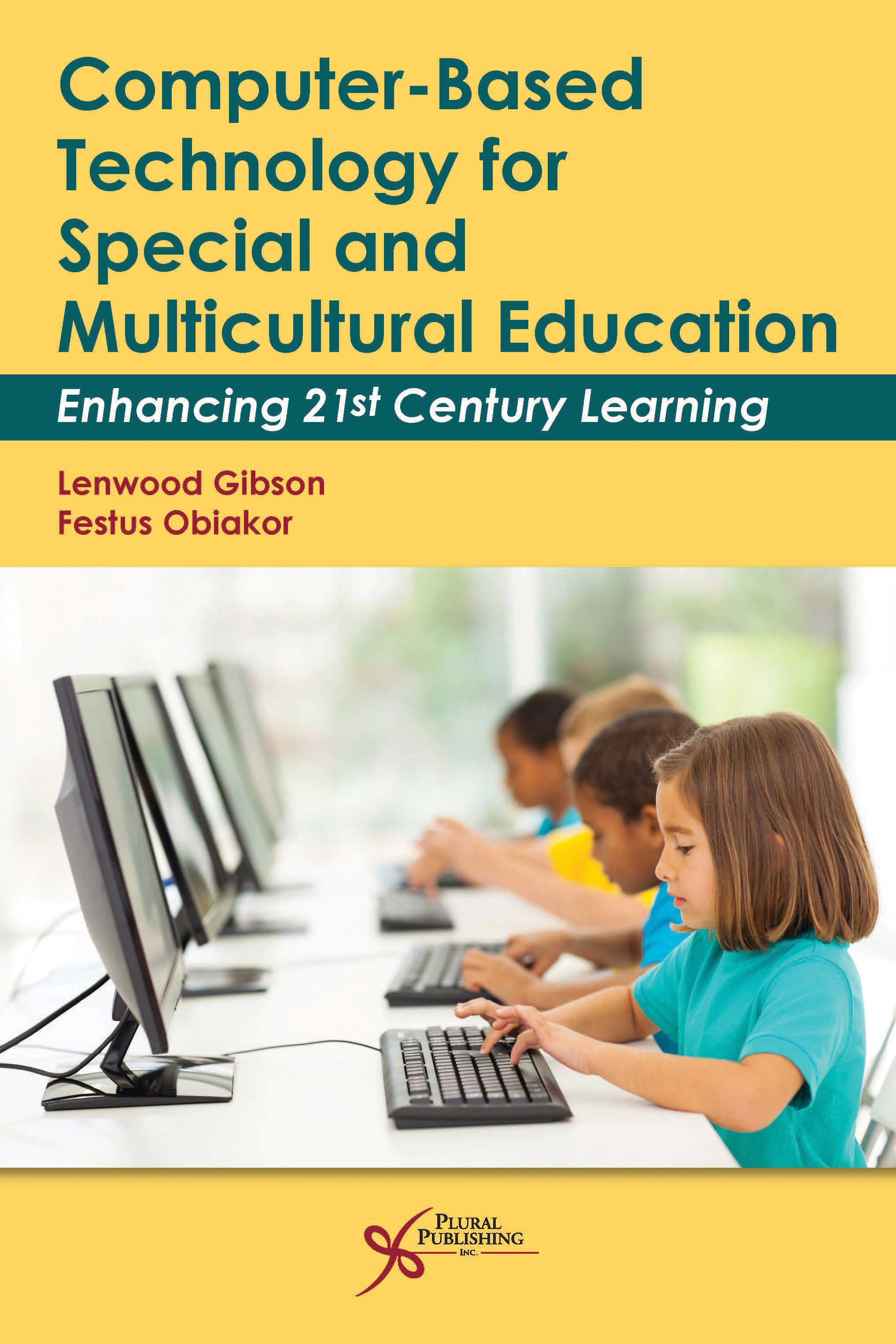
Computer-Based Technology for Special and Multicultural Education: Enhancing 21st Century Learning
First Edition
Lenwood Gibson Jr., Festus E. Obiakor
Details: 325 pages, B&W, Softcover, 6" x 9"
ISBN13: 978-1-59756-942-2
© 2018 | Available
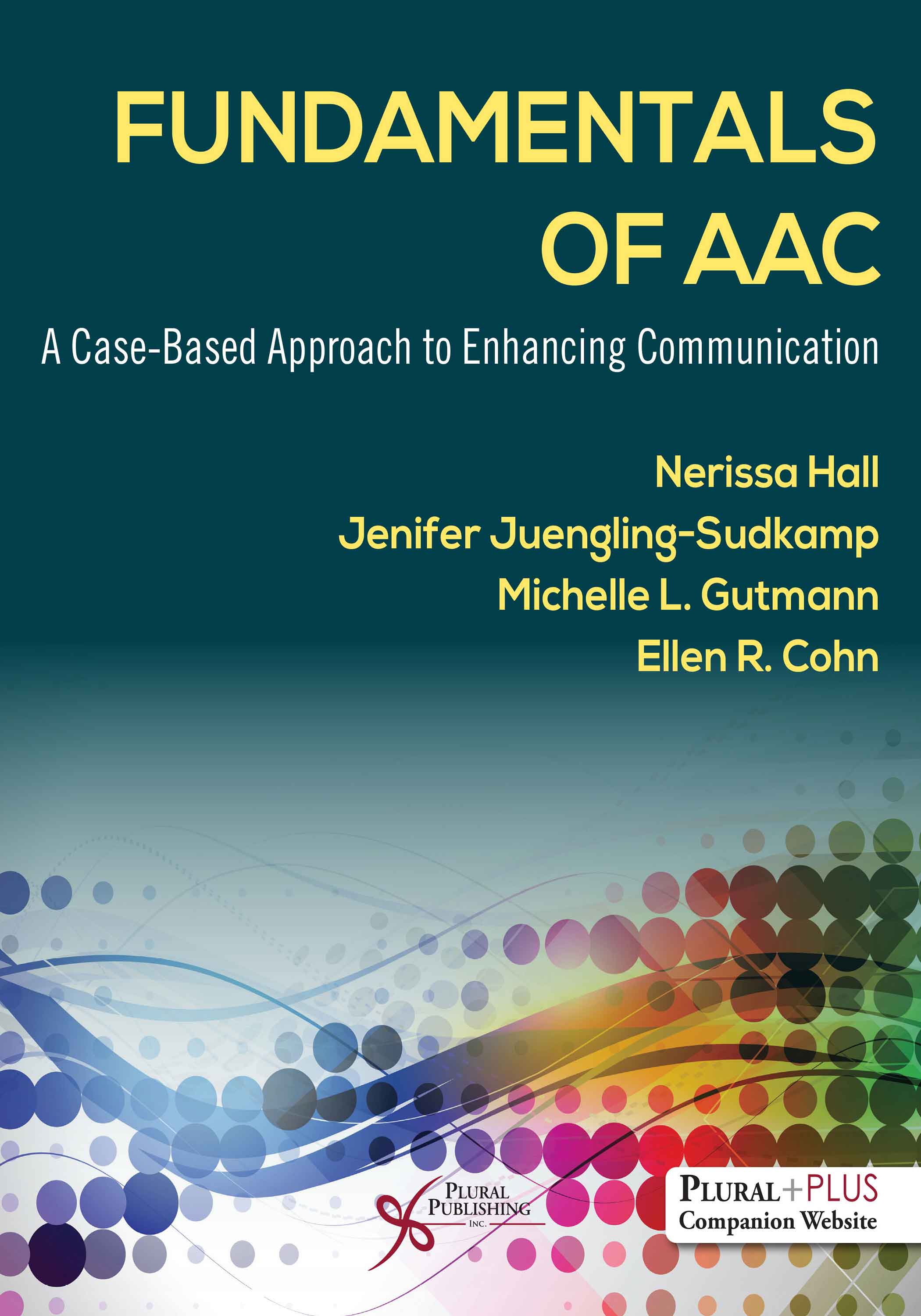
Fundamentals of AAC: A Case-Based Approach to Enhancing Communication.
First Edition
Nerissa Hall, Jenifer Juengling-Sudkamp, Michelle L. Gutmann, Ellen R. Cohn
Details: 545 pages, B&W, Softcover, 8.5" x 11"
ISBN13: 978-1-63550-353-1
© 2023 | Available
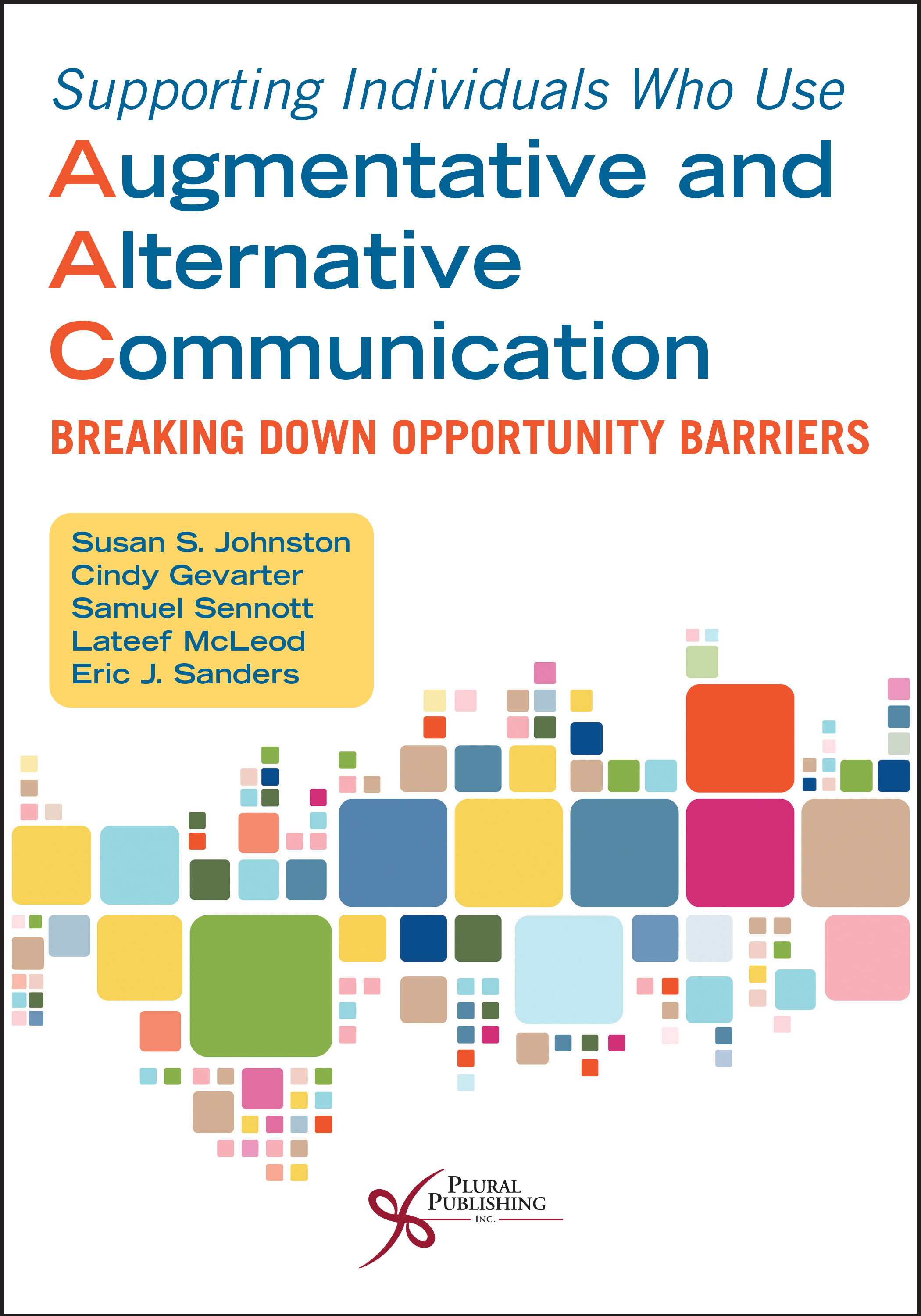
Supporting Individuals Who Use Augmentative and Alternative Communication: Breaking Down Opportunity Barriers
First Edition
Susan S. Johnston, Cindy Gevarter, Samuel Sennott, Lateef McLeod, Eric J. Sanders
Details: 270 pages, B&W, Softcover, 7" x 10"
ISBN13: 978-1-63550-391-3
© 2023 | Available
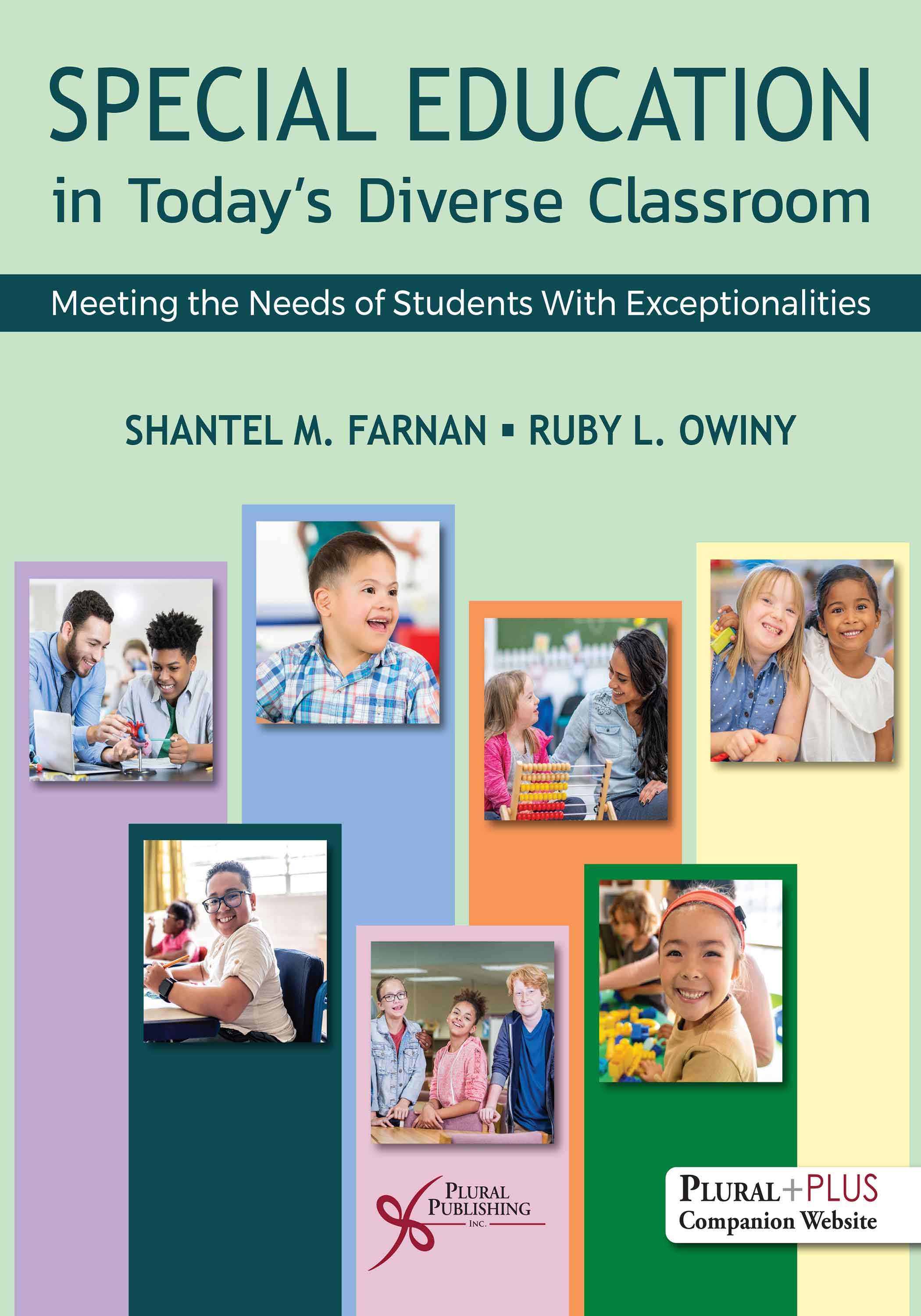
Special Eduation in Today's Diverse Classrooms: Meeting the Needs of Students With Exceptionalities
First Edition
Shantel M. Farnan, Ruby L. Owiny
Details: 350 pages, Full Color, Softcover, 8.5" x 11
ISBN13: 978-1-63550-750-8
© 2026 | Coming Soon
Release Date: 09/01/2025



